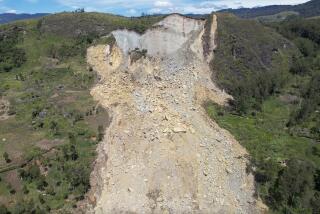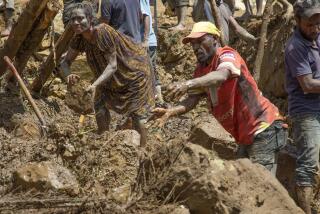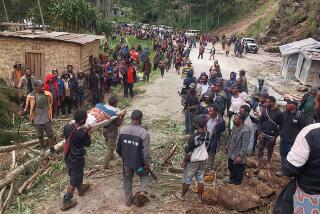‘Mine of Tears’ Conflict Imperils Papua New Guinea
PANGUNA, Papua New Guinea — The tribes on Bougainville Island speak 19 languages, but they use English to describe the giant Panguna copper mine in the center of the island’s vast jungles.
They call it the “mine of tears.”
Panguna is one of the world’s biggest open-pit mines: Gargantuan shovels have turned a small mountain into a gaping gray hole nearly a mile and a half across and half a mile deep--so huge that torrential rains sometimes drench one side while the sun bakes the other.
The Bougainville mine is the focus of a year-old secessionist war that threatens the economic and political future of the South Pacific’s largest and most mineral-rich country.
It is a small war--but a costly one. At least 45 people, mostly civilians, have been axed or shot to death on Bougainville. Soldiers and police officers have burned 1,600 homes and created 15,000 refugees, according to government reports. And the mine, the country’s largest revenue source, has been closed since May.
“This is the first time Papua New Guinea has experienced internal armed rebellion,” Prime Minister Rabbie Namaliu said.
A former adviser agreed: “For the first time, Papua New Guinea is writing its history in blood.”
Independent since 1975, the former Australian territory is a nation like no other. Largely uncharted and unknown until World War II, Papua New Guinea is home to about 1,000 tribes that speak nearly as many languages.
Most of the 3.7 million people live as their ancestors did, as subsistence farmers in jungle hamlets outside the cash economy. They have one of the world’s highest infant mortality rates and lowest life expectancies.
And change is not coming easily. Highland warriors in feathers and mud now use shotguns as well as spears in traditional tribal fights. Others dip arrows in DDT and other modern poisons.
But 1989 has brought special strains. In Port Moresby, the capital, soldiers smashed windows in Parliament to demand higher pay. Crowds rioted over reports that government officials had appeared in pornographic films. At other mines, there was sabotage and strikes.
The second-largest city, Lae, is under police curfew because of roving gangs of thugs called “rascals.” Violent crime is so common that auto rental agencies warn visitors not to stop in the event of an accident.
“It’s been a marked escalation of tension, of violence, and a perception that the government is not in control,” said a Western diplomat whose wife was recently attacked.
But Bougainville tops the list of trouble spots. Prime Minister Namaliu calls the rebellion the worst crisis in the nation’s young history.
“It’s one hell of an experience,” he said in an interview. “We’ve never had anything like it.”
Indeed, closing the mine wiped out 45% of the country’s export earnings and 17% of national revenues. If it cannot reopen, the government faces financial disaster.
“Investors are obviously worried,” another Western diplomat said. “Next year’s budget is already worthless.”
Hoping to end the impasse, the government decided in late November to reassign its 800 troops on Bougainville from chasing rebels to guarding the mine in an attempt to restart operations. But the militants dynamited a communications tower a week later, cutting the island’s telephone and telex links.
Bougainville has always been special. The dark Melanesians here proudly call themselves “blackskins” and scorn other Papua New Guineans as “redskins.” Many first called for secession 15 years ago.
The current conflict goes further back. In 1972, the Australian-owned Bougainville Copper Ltd. began mining low-grade ore in the rugged mountains 16 miles from the coast. The colonial-era agreement paid 58% of the profits to the national government, with only 5% to the province and 1% to the tribes that traditionally owned the land. There was discontent from the start.
“From the landowners’ perspective, they’ve given tremendous riches from their land and received a pittance in exchange,” said Graeme Kemelfield, head of Bougainville’s University Center.
Each share diminished as the tribes tripled in size. Villages never got promised roads or clinics. Deadlines on revising the agreement were ignored.
Anger boiled over in November, 1988, when the company denied killing fish in the once-rich Jaba River. Mine tailings had turned the river into liquid mud.
“They (the militants) said it defiled the sacred nature of the land,” a resident said.
Shortly afterward, former mine surveyor Francis Ona led a raid on company stores to steal dynamite. Within weeks, the rebels had blown up electric power pylons and attacked mine workers. In March, they burned the airport.
“Hardly a day goes by when someone isn’t getting injured, attacked or killed,” said Colin Evanson, a spokesman for Bougainville Copper. “Plus, they’ve caused hundreds of millions in damages and lost revenues.”
Ona’s Bougainville Revolutionary Army now has as many as 300 men, officials say. Most are armed with bows and four-foot arrows, or aging shotguns that fire lead fishing sinkers. But several use M-16 assault rifles and an M-79 grenade launcher stolen from the military.
In September, masked rebels shot and killed John Bika, the provincial minister, in his living room, as his wife and children looked on. Bika had advocated statehood, not secession.
“The militants have done ritual killings as well,” a military officer said. “They’ve chopped ears and fingers off, shot at ambulances, threatened hospital workers.”
Government forces are little better. When a wounded soldier died in Arawa General Hospital recently, four angry friends threatened to shoot the nurses in revenge.
“The riot police acted like pigs from the start,” company spokesman Evanson complained. “They burned 1,600 houses. No single natural disaster in Papua New Guinea has ever caused that kind of damage.”
One victim was Joseph Kabui, premier of the province. In July, police beat Kabui unconscious and blinded an aide in one eye by poking gun barrels in his face. The police accused the pair of secretly supporting the rebels.
“They forced me to lick up the blood of a policeman who had been shot that morning,” Kabui said.
The brutality only increased support for the rebels, said Roman Catholic Bishop Gregory Singkai, who has acted as go-between in peace negotiations. “It’s very stupid, burning and bashing and killing people. The militants, if they kill anybody, it’s in self-defense, because they are being hunted.”
The government has put 3,829 refugees in 19 camps since July. Several hundred live in blue plastic shelters at the Hookings camp in Arawa, the provincial seat. Barbed wire and armed guards keep refugees in and outsiders away.
“Everybody says these are prison camps,” said camp coordinator Steven Kewaka. “That isn’t true. These are care centers.”
No guards patrol the Biruana camp, five miles away in the jungle. Soldiers forced about 200 people there from Topinang and Amion villages after rebels were reported nearby.
Near the refugees’ huts, rice and boxes of canned meat and fish were stacked in a shed. Children played in the mud, and village elders smoked pipes in the shade. Several said the camp was livable--but not home.
“All our gardens are gone,” a 40-year-old man complained. “We have no privacy. And why? We did nothing wrong.”
The rebels demand independence for Bougainville, $11.5 billion for environmental damage and an end to the mining.
Negotiations have repeatedly failed. In October, the prime minister flew to Arawa to offer a $240-million aid package. He and tribal landowners shook hands over a pig, broke a bow and arrow and chewed betel nut in a traditional peace ceremony.
But even as they met, rebels ambushed an army patrol. And in a fiery radio address, Ona denounced any compromise as “rubbish and dust.”
“The peace initiatives all lack one thing,” one frustrated resident said. “The leader of the rebels is still in the bush and hasn’t changed his demands.”
The mine’s work force has shrunk from 4,000 to 1,700. Many foreigners have fled. Company officials will soon decide whether to shut down the mine and cut the staff to 350.
Such dire prospects are hotly debated over cold South Pacific beer at the rundown hotels and bars of Arawa, where burly Australians in shorts and knee-length socks gather before the nightly curfew.
“This will become a ghost town,” one businessman said. “Businesses will close. Schools will cut back. It’s a disaster.”
Another noted that several Australian coast watchers--who warned the Allies of Japanese air raids--eluded Japanese troops for years in Bougainville’s thick jungles during World War II.
Barry Middlemiss, a 27-year resident who runs the local newsstand, figures the rebels are doing even better.
“They’ve got the government on the run,” he said. “Are they winning? Of course they’re winning.”
More to Read
Sign up for Essential California
The most important California stories and recommendations in your inbox every morning.
You may occasionally receive promotional content from the Los Angeles Times.











